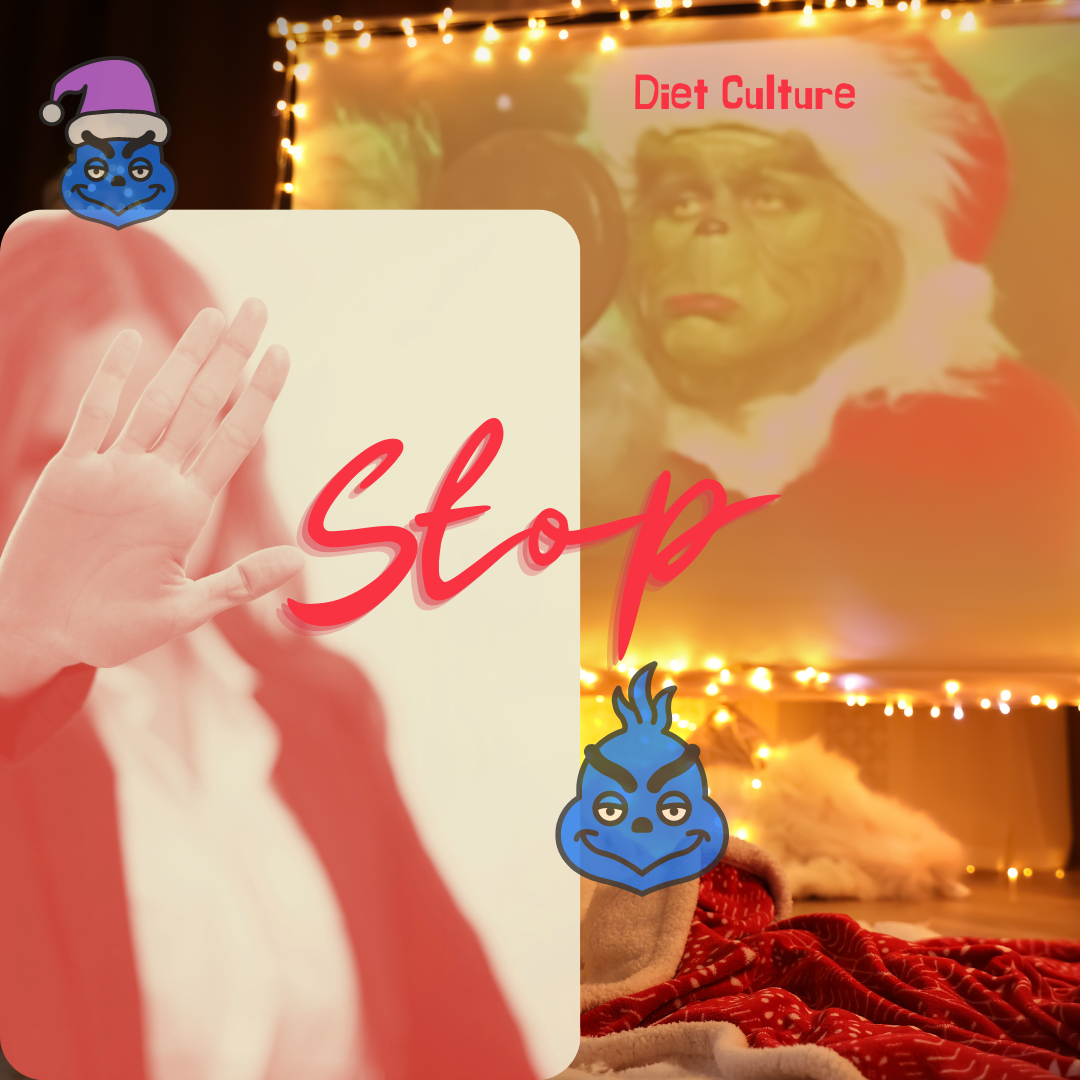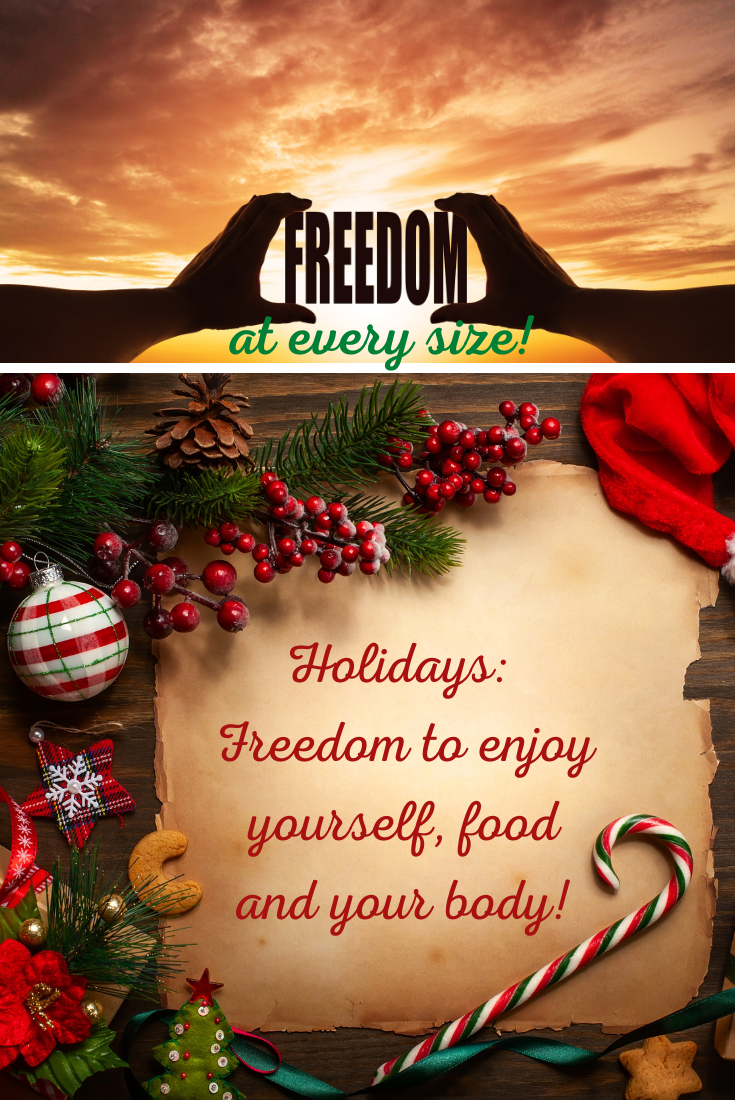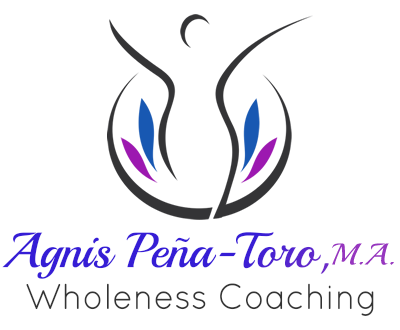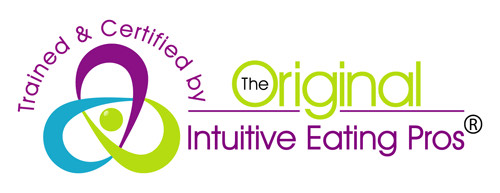Do you have mixed feelings about the Holidays? Is there a part of you excited about the foods, scents and flavors of the Holidays AND another part of you feeling terrified about overindulging and others’ comments about your body size and what you eat? Blame the Grinch’s diet culture for that!

Well, let me tell you that you’re not alone on this. I was there too for so many years as well as millions of other women around the world (and men have been increasingly been affected too). Many of us have grown up with so many rigid and toxic beliefs around their body size and food, imposed by diet culture, which usually increase during the holidays.
In this post, I’ll talk about the importance of women becoming aware of how diet culture impacts their lives on a daily basis and even more during the holiday season. I’ll define the term diet culture. I’ll talk about how food is more than calories and macros but also an opportunity for social and cultural connection to create positive memories and emotional attachments.
I’ll then provide 5 tips to stop diet culture from stealing your joy out of the holidays. Finally, I’ll give you a holiday gift! Yes, I’ll include a holiday recipe by the amazing food blogger and chef, Olga Muñoz, who created a delicious holiday dish from her beloved Colombia (and also inspired by the rich flavors of Latin American Cuisine), to graciously share with all of you. Read on to start the holiday party where the diet culture Grinch isn’t invited.
What’s Diet Culture?
Diet culture is a with values, norms, regulations and rules for how, when, how much, and how often one should eat. It equals weight and size to health and gives more importance to weight than mental, spiritual, relational and overall well-being.
It moralizes individuals based on what they eat and how much they weigh. It demonizes certain foods ingraining in people’s heads that there are “bad” and “good” foods, “healthy” and “unhealthy” foods. Diet culture equals one’s worthiness to our food choices and weight.
Its impact in life is so pervasive, that expert in intuitive eating and nutritionist, Christy Harrison, calls diet culture Unfortunately, living a life heavily controlled by diet culture’s beliefs could lead to negative consequences including low self-esteem, anxiety, body shame, excessive restriction and binging on foods, and ultimately
Food as source of Human connection and More
Diet culture can create fear in people of some types of foods, amount and frequency to eat. And it can make individuals think of foods only in terms of calories, macros and nutrition.
However, since the beginning of the world, food has not only served a nutritional function and wasn’t always tied to fitting into a standard concept of beauty and physical appearance (disguised under health) dictated by diet culture. The goes beyond that. Food can actually bring us closer to experience a richer human experience and whole health in all the following ways:
Social
Food gatherings with friends, family members, co-workers and others can foster social relationships, community connections and social bonding among human beings. Friendships and other types of relationships can be deepened and strengthened by sharing meals and a dining table with others. Everybody needs to eat, and have company and a sense of belonging to thrive in life.
Emotional
As social connections grow through eating together with others, emotional connection and attachment can also increase in meaningful and positive ways. The experience of sharing a (or meals with friends and others) that one desires and savors with pleasure can evoke a diverse range of emotions including joy, happiness, excitement, pleasure, and content. Experiencing all of these emotions with others allows your nervous system to relax and become energized while your brain releases the neurotransmitter dopamine so you feel pleasure in a natural and healthy way.
Mental health
Experiencing all sorts of pleasant emotions when eating a yummy meal on your own, or with others, will definitely impact mental health in positive ways. Your mind will have more opportunities to relax and think more clearly when you provide the fuel your body needs without constant worry or guilt. Also, when you have a pleasurable, balanced and healthy relationship with food, there are more chances of having a more optimistic outlook as the freedom you feel eating can transfer to other areas of life. Your self-esteem and capacity for self-compassion can also increase as eating becomes an enjoyable experience.
Cultural
Honoring the important role of food in the rich history of traditions, rituals, celebrations, and culture will also enrich your life as a whole in so many different ways and areas in addition to the ones mentioned above.
Embracing the dishes your mother and grandmother cooked for you as a child is going back in time to honor your ancestors’ ingredients, flavors, textures and what was sacred and meaningful to them. It connects you to them and your own cultural history. In this way they never die. They’re present and connected to you (and your offspring) beyond time, and space and your identity is reaffirmed and celebrated.
5 tips to avoid Diet Culture Grinch Stealing your Joy out of the Holidays!
1. Bombard yourself with Food and Body Liberating Messages
In the same way you have been bombarded with diet culture’s negative messages about how much you should eat and look, it’s ideal that you start exposing yourself to tons of messages that actually blow your mind and encourage you to reclaim your birthright to be respected, appreciated and loved at your current weight and at every weight!

Listen to these messages when you do the laundry, cook, clean, walk, etc. There is a lot to unlearn and learn. Here are some suggestions:
Podcasts:
Social media:
Audiobooks:
2. Set Boundaries with Others
You have the birthright to tell family members, relatives and friends to stop making comments about what you eat. These are some examples of how to set boundaries with others:
– Please, I’d appreciate it if you don’t make comments about my food choices. I respect yours, please respect mine.
– I just want to have a good time, enjoy my family and be at peace. I know what I’m doing. I appreciate your concern. Thank you.
– I’m totally fine. If you ever want to know about my food journey, I can openly talk to you about it as long as you listen with respect, empathy, and an open mind. Let me know. Thanks so much.

You also have the birthright to ask family members, relatives and friends to stop making comments about your body size:
– Please, I’d appreciate it if you don’t make comments about my body, my size, my shape, etc. I respect yours, please respect mine.
– I just want to have a good time, enjoy my family and be at peace. I appreciate your concern. Thank you.
– I’m totally fine and starting to enjoy freedom in body and mind for the first time in my life. If you ever want to know about my body image journey.
– I can openly talk to you about it if you listen with respect, empathy, and an open mind. Let me know. Thanks so much.
Choose your own words and phrases. Speak from your heart while setting boundaries with others for self-respect and without apologies.
3. Eat for Nutrition, Hunger, Cultural Tradition and Pleasure
If you’re hungry for breakfast, eat breakfast. If you’re hungry for lunch, eat lunch. If you’re hungry for dinner, eat dinner. If you are hungry for snacks, eat them. Don’t skip regular meals planning for a holiday celebration as diet culture would like you to do.
When you stop eating or fast to make room in preparation for a holiday meal/celebration, most of the time you’ll end up eating more as your mind and body notice that you haven’t been fed enough during the day and will most likely make you eat continuously to compensate. Your body and mind will become concerned believing you’re starving so when you encounter and see food, you’ll probably overeat and feel stuffed and physically uncomfortable.

Also, it’s okay to eat when you’re not hungry just because there is a special holiday treat available that you like a lot and/or you have a special emocional/cultural/familial connection to. Eating in this way will bring so much satisfaction and pleasure and will bring you closer to others emotionally and socially. Also, when you find satisfaction in what you eat, most likely you won’t eat past your fullness limit causing physical pain. Trust your body!
4. Daily Gratitude Practice
Building a daily gratitude practice is one of the most empowering things that you can do for yourself, and your mental and physical health. There is plenty of research and studies showing how the brain lights up in brain scans when an individual thinks and feels in their mind and body about things, people and situations they feel grateful for.
Get a beautiful notebook or journal. Everyday write down 5-10 things you feel grateful for in your life right now. For example, I have functional legs, arms, and hands. My heart functions properly. I have hair that protects me from the sun and the cold. I have friends who care about me. I have a comfy bed. I exist and breathe every day.
Allow yourself to feel in your body, mind and heart the emotions that arise as you think about these 10 things. You could also sit while closing your eyes and think about these things and then let your body, heart and mind feel the emotions that come with it. Allowing yourself to feel the emotions in this practice is key for mental and physical health, as well as for the healing of your heart and body.
Then, read each one of the things that you feel grateful for in your list. Let your body, mind and heart savor the yummy emotions that are coming up. Close your eyes again and take a deep breath while placing a hand or two on your heart.
Now, I’m going to invite you to create a playlist of at least 10 songs that elicit gratitude in you. You can make the playlist in Spotify, Youtube or somewhere else you prefer. Listen to the songs and pay attention to the emotions arising, embrace them, enjoy them, breathe them in.
I hope this experience is yummy and delicious for you!
5. Self-Nourishment
In the same notebook you got for your daily gratitude list (see above), write down one thing you could do for nourishing your mind, heart, body and soul every day. Writing down what you want to give yourself for self-nourishment everyday (or a few days a week), makes a statement about how important you are to yourself, your mind, heart and body. Diet culture will never ask you to focus in your inner noursinghing experience but you can start slowly to change that now.
Here are some ideas:
– Guided Tender Self-compassion Break Meditation (less than 5 minutes) by Kristin Neff, Ph.D.that you could listen to when still in bed in the morning, during your lunch break or to fall asleep at night while listening to it.

-In your shower, take a pulsing showerhead and hover it on different parts of your body. Perhaps, start with your arms and pay attention to the sensations of the water running through your skin. What sensations do you notice?: flowing, soft, fluid, energized, cold, warm, streaming, calm.
Also pay attention to the emotions you’re starting to feel: joy, calmness, satisfaction, tranquility, interest, excitement, etc. as the water continues to run through your skin in different parts of your body.
While feeling the sensation of the water over your skin, tell yourself: “these are my tights, they belong to me”, “these are my arms, they belong to me”, “there are my hands, they do many things for me”, “these are my elbow, they work and help me everyday.” This exercise is adapted from the book Healing Trauma by Peter Levine, Ph.D where you can find more tools and ideas to connect to your body and help it self-regulate.
– Pamper yourself by taking a bubble or warm bath, giving yourself a hand and feet massage, having lunch with a close friend, dancing in your bedroom to your favorite music, saying yes to a dream of yours, reaching out for support, and saying to yourself self-compassionate words and phrases in the same way you’d do with a close friend who is going through a difficult situation or had a win situation in their life.
Look for little things in your life that could be sources of self-nourishment. You deserve it and need it for your well-being, whole health and joy during the Holidays and beyond!
Holiday Recipe
Now, it’s eating time! Here is the Holiday dish recipe created by Olga Muñoz from Cocina Republic: Crispy and Tender Pernil inspired by the rich flavors from Latin American cuisine.This is our gift to you wishing you a connected, compassionate relationship with your body, food, mind and soul during the Holidays!

5 Tips to Stop Diet Culture from Stealing your Joy out of the Holidays!
Having a healthy relationship with your body and food includes giving yourself permission and freedom to enjoy the holidays with all of its flavors, scents and foods without apologies.
We’re talking here about a relationship with your body and food that is flexible, intuitive and compassionate that includes social and emotional connection to yourself, family members, partners, your children, your culture and traditions, friends and others.
Don’t let diet culture’s beliefs and non-sense body and food morality rules ruin the opportunity to enjoy yourself during the Holidays and reclaim space and respect for your body and yourself in your home, community and in the entire world at every size and without apologies. I’m sorry Diet Culture Grinch!
If you’d like to dive deep into transforming your relationship with food and your body so you can enjoy freedom, choice, flexibility, connectedness, whole health and pleasure, I’ll be happy to chat with you on a free discovery call. Book your call now.


